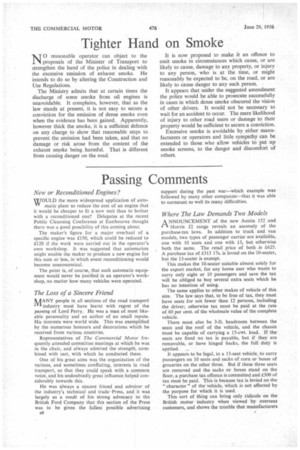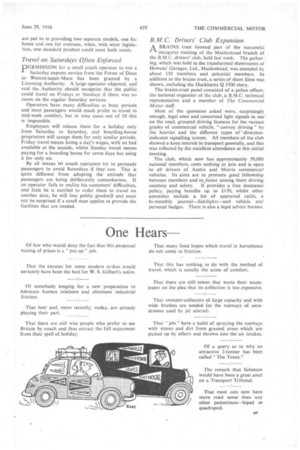Passing Comments
Page 42

Page 43

If you've noticed an error in this article please click here to report it so we can fix it.
New or Reconditioned Engines?
WOULD the more widespread application of automatic plant so reduce the cost of an engine that it would be cheaper to fit a new unit than to bother with a reconditioned one? Delegates at the recent Public Cleansing Conference at Eastbourne thought there was a good possibility of this coming about.
The maker's figure for a major overhaul of a specific engine was £150, which could be reduced to £120 if the work were carried out in the operator's own workshop. It was suggested that automation might enable the maker to produce a new engine for this sum or less, in which event reconditioning would become uneconomical.
The point is, of course, that such automatic equipment would never be justified in an operator's workshop, no matter how many vehicles were operated.
The Loss of a Sincere Friend
NAANY people in all sections of the road transport "1 industry must have learnt with regret of the passing of Lord Perry. He was a man of most likeable personality and an author of no small repute. His interests were world wide. This was exemplified by the numerous honours and decorations which he received from various countries.
Representatives of The Commercial Motor frequently attended committee meetings at which he was in the chair, and always admired the strength, combined with tact, with which he conducted these.
One of his great aims was the organization of the various, and sometimes conflicting, interests in road transport, so that they could speak with a common voice, and his undoubtedly great influence helped considerably towards this.
He was always a sincere friend and admirer of the industry's technical and trade Press, and it was largely as a result of his strong advocacy to the British Ford Company that this section of the Press was to be given the fullest possible advertising
aft support during the past war—which example was followed by many other companies—that it was able to surmount so well its many difficulties.
Where The Law Demands Two Models
A NNOUNCEMENT of the new Austin 152 and
Morris 12 range reveals an anomaly of the purchase-tax laws. In addition to truck and van models, two types of passenger carrier are available, one with 10 seats and one with 13, but otherwise both the same. The retail price of both is £625. A purchase tax of £313 17s. is levied on the 10-seater, but the 13-seater is exempt.
This makes the 10-seater suitable almost solely for the export market, for any home user who wants to carry only eight or 10 passengers and save the tax will be obliged to buy several extra seats which he has no intention of using.
The same applies to other makes of vehicle of this size. The law says that, to be free of tax, they must have seats for not fewer than 12 persons, including the driver; otherwise tax must be paid at the rate of 60 per cent. of the wholesale value of the complete vehicle.
There must also be 3-ft. headroom between the seats and the roof of the vehicle, and the chassis must be capable of carrying a 15-cwt. load. If the seats are fixed no tax is payable, but if they are removable, or have hinged backs, the full duty is applied.
it appears to be legal, in a 13-seat vehicle, to carry passengers on 10 seats and sacks of corn or boxes of groceries on the other three. But if these three seats are removed and thesacks or boxes stand on the floor, a purchase tax offence is committed and £300 of tax must be paid. This is because tax is levied on the " character " of the vehicle, which is not affected by the purpose for which it is used.
This sort of thing can bring only ridicule on the British motor industry when viewed by overseas customers, and shows the trouble that manufacturers are put to in providing two separate models, one for home and one for overseas, when, with wiser legislation, one standard product could meet both needs.
Travel on Saturdays Often Enforced
PERMISSION for a small coach operator to run a
Saturday express service from the Forest of Dean to Weston-super-Mare has been granted by a Licensing Authority. A large operator objected, and said the Authority should recognize that the public could travel on Fridays or Sundays if there was no room on the regular Saturday services.
Operators have many difficulties at busy periods and most passengers would much prefer to travel in mid-week comfort, but in nine cases out of 10 this is impossible.
Employers will release them for a holiday only from Saturday to Saturday, and boarding-house proprietors will accept them for only similar periods. Friday travel means losing a day's wages, with no bed available at the seaside, whilst Sunday travel means paying for a boarding house for seven days but using it for only six.
By all means let coach operators try to persuade passengers to avoid Saturdays if they can. This is quite different from adopting the attitude that passengers are being deliberately cantankerous. If an operator fails to realize his customers' difficulties, and feels he is entitled to order them to travel on another date, he will lose public goodwill and must not be surprised if a small man applies to provide the facilities that are needed.
B.M.C. Drivers' Club Expansion
A BRAINS trust formed part of the successful inaugural meeting of the Maidenhead branch of the B.M.C. drivers' club, held last week. The gather-ing, which was held in the transformed showrooms of Hewens' Garages, Ltd., Maidenhead, was attended by about 150 members and potential members. In addition to the brains trust, a series of short films was shown, including the Duckhams Q 5500 story.
The brains-trust panel consisted of a police officer, the national organizer of the club, a B.M.C. technical representative and a member of The Commercial Motor staff.
Most of the questions asked were, surprisingly enough, legal ones and concerned light signals in use' on the road, grouped driving licences for the various grades of commercial vehicle, "convoy driving" by the heavies and the different types of directionindicator signalling system. All members of the club showed a keen interest in transport generally, and this was reflected by the excellent attendance at this initial meeting.
The club, which now has approximately 50,000 national members, costs nothing to join and is open .to all drivers of Austin and Morris commercial vehicles. Its aims are to promote good fellowship between members and to,foster among them driving courtesy and safety. It provides a free insurance policy, paying benefits up to £150, whilst other amenities include a list of approved cafes, a bi-monthly journal—Sidelights—and vehicle and personal badges. There is also a legal advice bureau.
















































































































































